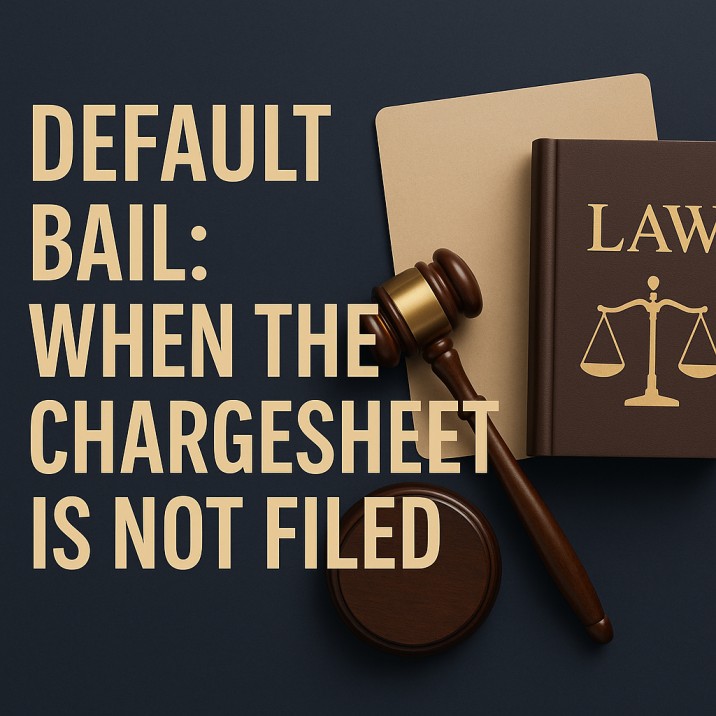
Introduction
The relief of default bail is different from anticipatory bail, regular bail and interim bail. Default bail is granted on the default of the police or investigating officer to file its report/complaint/chargesheet within a specific prescribed period. It is also called statutory bail. The right to bail on the default of a police investigation is considered an “indefeasible right.” The provision of Section 167(2) of CrPC / Section 187(3) BNSS deals with the Default bail.
Time Limit for Filing Chargesheet
The time for filing the chargesheet is 90 days, where an offence is punishable with death, imprisonment for life or imprisonment for a term of not less than ten years and 60 days, where the investigation relates to any other offence.
The Supreme Court held that the accused has a right to be released on bail under this provision even in serious and grave offences.
The period of 90 days begins from the day on which the accused presented before a magistrate within 24 hours of arrest and the magistrate sent the accused into police custody. The period of 90 days is the total period of custody — police custody and judicial custody.
High Court Interpretation on Section 307 IPC / Section 112 BNS
The Hon’ble High Court held that where the petitioner therein was alleged to have committed the offence punishable under Section 307 IPC / Section 112 of BNS and did not cause any hurt, held the case falls under the first part of Section 307 IPC / Section 112 BNS and the prescribing imprisonment which may extend to ten years and the maximum period of detention in custody would be 60 days as contemplated under the proviso (a)(ii) of Section 167(2) of Cr.P.C / 187(3)(a)(ii) BNSS. Accordingly, if the chargesheet is not filed within 60 days of the date of detention, the petitioner is entitled to be released on bail.
Supreme Court on Right to Bail
The apex court held that the accused gets an indefeasible right to default bail if he makes an application after the maximum period for investigation of an offence is over, and before a chargesheet is filed.
Limitation Periods Under Special Acts
- In NDPS Act, (Narcotic Drugs and Psychotropic Substances Act 1985), the default time is 90 days only, which can be extended up to one year.
- In the UAPA Act (Unlawful Activities (Prevention) Act 1967), the default limit is 90 days only, which can be extended to another 90 days.
- The time can be granted only on a report of the Public Prosecutor, indicating the progress made in the investigation.
- The extension of time is not automatic but requires a judicial order.
Whether Default Bail Can Be Cancelled After the Presentation of the Chargesheet?
Yes, default bail can be cancelled.
There is no absolute bar that once a person is released on default bail, it cannot be cancelled on merits and grounds like not cooperating with the investigation. Mere non-filing of a chargesheet will not be enough when a strong case is made out.
Code of Criminal Procedure, 1973; proviso to Section 167(2) / Section 187(3) of BNSS – in a case where an accused is released on default bail under Section 167(2) Cr.P.C. / 187(3) BNSS, and thereafter on the filing of the chargesheet, a strong case is made out and on special reasons being made out from the chargesheet that the accused has committed a non-bailable offence and considering the grounds set out in Sections 437(5) / 482 BNSS and Section 439(2) / 483 BNSS, his bail can be cancelled on merits and the Courts are not precluded from considering the application for cancellation of the bail on merits.
The merits brought out in the chargesheet and attending circumstances are relevant, as the bail was granted due to the default of the investigating officer without the Court’s adverting to the merits but strong grounds are necessary to cancel the bail and mere filing of the chargesheet itself is not sufficient.
Conclusion
Default bail, also known as statutory bail, serves as an important safeguard for the personal liberty of an accused. It ensures that the investigative agencies act within the prescribed legal timelines. The failure of the prosecution to file the chargesheet within 60 or 90 days—depending on the nature of the offence—entitles the accused to seek release on bail under Section 167(2) of the CrPC / Section 187(3) of the BNSS. However, this right, though “indefeasible,” is not absolute. Once the chargesheet is filed, the bail granted on default can still be cancelled if strong grounds emerge from the case’s merits, especially under Sections 437(5) / 482 BNSS and 439(2) / 483 BNSS. Therefore, both the accused and the prosecution must understand the nuanced balance between procedural rights and substantive justice when dealing with default bail applications.
